Translated by Zameelur Rahman
Question:
Did the eminent shaykh, the scholar of his time, Mawlawi Rashid Ahmad Gangohi, say that the Creator (Exalted is He) has actually lied, and that the one who says this has not erred, or is this amongst the fabrications against him? Assuming the latter, how do you respond to what Al-Barelwi (Ahmad Rida Khan) mentioned that he has with him a photocopy of the respected shaykh’s fatwa?
Answer:
That which they attributed to the eminent and incomparable shaykh, the scholar of his time, the peerless of his age, Mawlana Rashid Ahmad Gangohi, that he said that the Creator (Exalted is His Eminence) actually lied and that the one who says this has not erred, it is a fabrication about him (Allah Most High have mercy on him) and is from the lies concocted by the deceptive and lying devils (Allah confound them! How they are perverted!). His respected person is innocent of such heresy and disbelief. The fatwa of the shaykh that was printed and published in volume one of his Fatawa Rashidiyyah (p. 119) falsifies their [claim]. It is in Arabic and was verified and stamped with the seals of the ‘ulama of Makkah al-Mukarramah. A copy of this question [and answer] follows:
In Allah’s Name, the Ever Merciful, the Beneficent. We praise Him and send blessing on His noble Messenger. What is your view (your blessings last!) on Allah being described with the attribute of falsehood? And what is the ruling on the one who believes He lies? Provide us with an answer, and be rewarded.
Answer:
Allah (Exalted is He) is certainly transcendent beyond being described with falsehood, and no element of falsehood is found in His Speech, as Allah says, “Who is more truthful than Allah in speech?” (4:122) Whoever believes or professes that Allah lies, he is certainly an accursed disbeliever, and has opposed the Book, the Sunna and the Consensus of the Ummah.
Yes, the belief of the people of faith is: that which Allah foretold in the Qur’an, that Pharaoh, Haman and Abu Lahab are from the inhabitants of Hell, it is a decisive decision that He will not act contrary to, but Allah (Exalted is He) is Able to admit them into Paradise and is not incapable of this, but He will not do so by His choice.
Allah (Exalted is He!) said, “And if We had so willed, We could have given every soul its guidance, but the word from Me concerning evildoers took effect: that I will fill the Fire with the jinn and mankind together.” (32:12). It is evident from this verse that had Allah wished, He would have made everybody believers but He does not contradict what He says, and this is all by choice, not coercion. He is a Doer by choice, acting as He wills.
This is the belief of all the ‘ulama of this Ummah, as Al-Baydawi said under the explanation of His statement (Exalted is He), “If you forgive them…” (5:118) that “the absence of forgiveness for shirk is a consequence of His threat, but it is not intrinsically impossible.” Allah knows best the truth.
The lowly Rashid Ahmad Gangohi (may he be pardoned) wrote this.
A review of the endorsements of the ‘ulama of Al-Makkah al-Mukarramah, Allah increase its honour:
“All praise to the One Who is deserving of it, and from Him extends all help and guidance. That which ‘Allamah Rashid Ahmad said in reply as cited [above] is the truth from which there is no escape. Allah send blessings and peace on the Seal of the Prophets, his family and his companions.”
The servant of the Shari’ah, seeking tender grace, Muhammad Salih ibn al-Marhum Siddiq Kamal al-Hanafi (Allah support them), the present Mufti of Al-Makkah al-Mukarramah, ordered his signature.
The one hopeful of perfect attainment from His Lord, Muhammad Sa’id ibn Muhammad Babusayl at the Protected Makkah (Allah forgive him and his parents, and his teachers and all the Muslims) signed it.
Seeking pardon from the Giver of bestowals, Muhammad ‘Abid ibn al-Marhum Shaykh Husayn, Mufti of the Malikis at the Protected Land of Allah, [signed it].
“[After] sending blessing and peace; that which ‘Allamah Rashid Ahmad answered is sufficient and upon it is dependence, rather it is the truth from which there is no escape.”
Written by the lowly one, Khulf ibn Ibrahim, a servant of ifta (answering juristic problems) for Hanbalis, at the Noble Makkah.
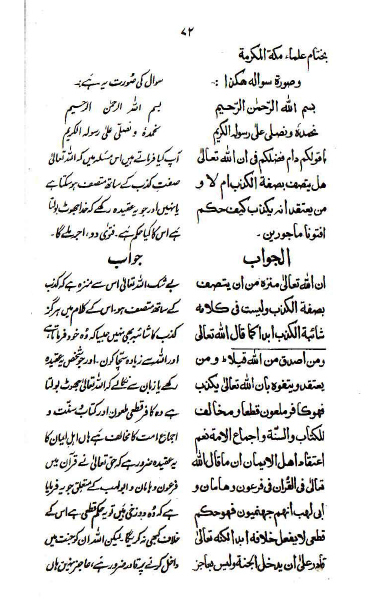
A page from Al-Muhannad ‘ala ‘l-Mufannad
The response to what Al-Barelwi said that he has in his possession a copy of the fatwa of the deceased shaykh in photocopy form containing what he mentioned, it is from his inventions that he invented and forged by himself, as a slander against the shaykh (Allah sanctify his secret). Such lies and slanders are insignificant for him, for he is the teacher of teachers in this and all of them are dependent on him in his time, and indeed he is a distorting manipulator and a scheming imposter, sometimes creating outright forgeries. He is not less than the Masih al-Qadiyani, since the latter claims messengership manifestly and openly, and the former conceals [hopes of] being the mujaddid, and anathematises (yukaffiru) the ‘ulama of the Ummah, just as the Wahhabis, the followers of Muhammad ibn ‘Abd al-Wahhab, anathematise the Ummah (Allah Most High disgrace him as He disgraces them).
Question:
Do you believe in the possibility of the occurrence of falsehood in a speech from the Speech of the Master (Great and Glorious is His Transcendence). If not, what then is your opinion?
Answer:
We and our elders (Allah Most High have mercy on them) declare and are convinced that all speech that issued from the Creator (Great and Glorious is He) or will issue from Him is absolutely truthful, and it is certain that it concurs with reality. Undoubtedly, there is no trace of falsehood in any part of His (Exalted is He) Speech, nor any doubt about [the absence of] contravening reality [in His Speech]. Whoever believes contrary to this or conceives of a lie in any part of His Speech, is a disbeliever, apostate and heretic, and does not have even a trace of faith.
Question:
Have you ascribed the view of “imkan al-kadhib” (the possibility of lying) to some of the Ash’aris? If so, what is meant by this? And do you have a proof-text for this view from the reliable scholars? Explain the matter to us as it is.
Answer:
This began as a dispute between us and the Indian logicians and innovators about the capacity of the Maker (Transcendent is He) to act contrary to what He promised, informed, intended, etc. They said that acting contrary to these things is absent from Allah’s Ancient Power (qudrah qadimah), hypothetically impossible (mustahil aqlan), impossible to exist within His capacity, and it is necessary for Him [to act] in accordance with His promise, report, intent and knowledge. We said: such things are certainly capacitated, but their occurrence (wuqu’) is not possible, according to the Ahl al-Sunna wa l-Jama’a from the Ash’aris and Maturidis, textually and logically according to the Maturidis, and only textually according to the Ash’aris.
They objected that if the capacity of these things were possible, it would entail the possibility of falsehood and this is certainly not in His capacity and is intrinsically impossible (mustahil dhatan). We responded using a variety of answers from the kalam-scholars, of which was: even if the concomitance of the possibility of falsehood in acting contrary to the promise, reports etc. in His capacity is accepted, it too is not intrinsically impossible, rather, like oppression and impudence, it is intrinsically capacitated, but it is textually and logically impossible, or just textually, as more than one of the Imams have espoused.
When they saw these responses they caused corruption in the land and attributed to us [the position of] allowing imperfections (naqs) in relation to His Holiness (Blessed and Exalted is He), and they spread this accusation amongst the foolish and the ignorant to create enmity in the common people and to seek enjoyment and popularity amongst men. They reached the roads of the heavens in fabrication when they forged an image from themselves [expressing] the actuality (fi’liyyah) of falsehood without fearing the Knowing King. When Indians became aware of their scheming, they [i.e. the innovators] sought help from the noble ‘ulama of the two Sanctuaries because they know they are ignorant of their evil and the reality of the views of our ‘ulama.
Their likeness is but the likeness of the Mu’tazilah as compared with the Ahl al-Sunna wa l-Jama’a, since they [i.e. the Mu’tazilah] excluded rewarding the sinner (ithabat al-‘asi) and punishing the obedient (‘iqab al-muti’) from the Ancient Power and made justice (‘adl) necessary for Allah’s essence. They called themselves “the advocates of justice and transcendence” and they attributed injustice, unconscientiousness and ugliness to the ‘ulama of Ahl al-Sunna wa l-Jama’a. So just as the predecessors of Ahl al-Sunna wa l-Jama’a did not mind their ignorance and did not permit incapacity in relation to Him (Transcendent and Exalted is He!) in the aforementioned injustice, and broadened the Ancient Power while also removing imperfections from His Noble Absolute Self, and perfecting the transcendence and sanctity of His Lofty Holiness, saying that, “Your understanding of the possibility of the capacity to punish the obedient and reward the sinner as an imperfection, is but the consequence of [following] despicable philosophers”; in the same way, we say to them, “Your understanding of the ability to act contrary to the promise, report and truth and the likes of them, as an imperfection, although their issuance (sudur) from Him (Exalted is He) is impossible, only textually, or rationally and textually, is but the misfortune of philosophy and logic and your adverse ignorance.”
They do what they do because of the absolute transcendence [of Allah], but they are unable to perfect the Power and broaden it. As for our predecessors, the Ahl al-Sunna wa l-Jama’a, they combined between the two matters, of widening the Power and perfecting transcendence for the Necessary (Transcendent and Exalted is He).
This is what we mentioned in Al-Barahin in summary-form, and here are some of the proof-texts in support of it from the relied upon books of the madhhab:
(1) It says in Sharh al-Mawaqif:
“All the Mu’tazilites and Kharijites make punishing the one who incurs a major sin necessary when he dies without repentance and they do not allow Allah to pardon him for two reasons:
“First, He (Exalted is He) made it a promise to punish major sins and informed [us] of this i.e. punishment because of it, so if He does not punish for a major sin and pardons, it would entail reneging on His threat and falsehood in His speech, which are impossible. The answer is, the conclusion of this [argument] is that punishment will [actually] occur, so where is the [intrinsic] necessity of punishment, on which is our discussion, since there is no doubt that non-necessity [of punishment] along with [its] occurrence does not entail reneging and falsehood? It cannot be said that it entails their possibility which is also impossible, because we say: its impossibility is prohibited. How so, when they are from the possibilities included in His (Exalted is He) Power?” End [quote from Sharh al-Mawaqif]
(2) In Sharh al-Maqasid by ‘Allamah al-Taftazani (Allah Most High have mercy on him) at the end of the discussion on Power, [he says]:
“The deniers of the inclusiveness of His Power are many groups; of them are Al-Nazzam and his [Mu’tazilite] followers who say that He does not have power over ignorance, falsehood and oppression and all ugly acts (qaba’ih), for if their creation were in His capacity, their issuance (sudur) from Him would be possible, and this concomitant (lazim) is false because it results in impudence (safah) if He knows the ugliness of this and its dispensability, and in ignorance if He is not knowing. The response is: we do not concede the ugliness of a thing in relation to Him, how [can we accept this] when He is in complete control of His kingdom? And if it [i.e. ugliness in relation to Him] is conceded, Power over it does not negate the impossibility of its issuance from Him, by consideration of the presence of disposal and the absence of need, even if it is possible (mumkinan).” End [quote from Sharh al-Maqasid], in summary-form.
(3) It says in al-Musayarah and its commentary Al-Musamarah by ‘Allamah al-Muhaqqiq Kamal ibn al-Humam al-Hanafi and his student Ibn Abi l-Sharif al-Maqdisi al-Shafi’i (Allah Most High have mercy on them), the text of which is:
“Then he i.e. the author of Al-‘Umdah said, ‘Allah (Exalted is He) is not described with Power over oppression, impudence and falsehood because the impossible is not included in [His] Power, i.e. it is improper for it to pertain to them. According to the Mu’tazilah, He (Exalted is He) is Able over all that but does not do [them].’ End quote from Al-‘Umda.
“It appears as though he altered that which he transmitted from the Mu’tazilah, since there is no doubt that the absence of power over what was mentioned, is the madhhab of the Mu’tazilah. As for its presence, i.e. power over what was mentioned, and then abstention from pertaining to them by choice, to the madhhab, i.e. it is to the madhhab of the Ash’aris, more fitting than it is to the madhhab of the Mu’tazilah. It is obvious that this more fitting [position] is also included in transcendence, since there is no doubt that abstention therefrom i.e. from those things mentioned of oppression, impudence and falsehood, is from the matter of transcendence, from that which does not befit the majesty of His Holiness (Exalted is He).
“Hence, it should be understood by the foregone premise, i.e. the intellect understands, which of the two views are more excessive in transcendence from indecencies: is it power over it, i.e. what was mentioned from the three matters, along with impossibility, i.e. His abstention from it by choosing that abstention; or its impossibility from Him because of the absence of power over it? It is incumbent to rely on the more inclusive of the two statements in transcendence, which is the statement more fitting to the madhhab of the Ash’aris.” End [quote from al-Musamarah].
(4) In Hawashi al-Kalnabwi ‘ala Sharh al-‘Aqa’id al-Adudiyyah by Al-Muhaqqiq al-Dawwani (Allah Most High have mercy on them) [it is mentioned], the text of which is:
“In sum, lying being ugly in the uttered-speech (al-kalam al-lafzi), in the sense that it is an attribute of deficiency, is prohibited according to the Ash’aris. That is why Al-Sharif al-Muhaqqiq (al-Jurjani) said it is from the totality of the possibilities (mumkinat), and acquiring decisive knowledge of its non-occurrence in His speech by consensus of the scholars and the Prophets (upon them be peace) does not negate its intrinsic possibility like all decisive knowledge of normal occurrences (al-‘ulum al-‘adiya) and it does not negate what Imam al-Razi said,” to the end.
(5) In Tahrir al-Usul by the author of Fath al-Qadir, Imam ibn al-Humam, and its commentary by Ibn Amir al-Hajj (Allah Most High have mercy on them) [they say], the text of which is:
“Therefore – i.e. since whatever is conceived as a deficiency is impossible for Him – the decisiveness of the impossibility of attributing Him – i.e. Allah (Exalted is He) – with lying and the like of it (Transcendent is He beyond that) becomes apparent. Also, if His act being attributed with ugliness was possible, confidence in the integrity of His promise, the integrity of His speech besides it – i.e. [besides] His (Exalted is He) promise – and the integrity of His Prophets would disappear – i.e. in principle, His integrity would be uncertain.
“According to the Ash’aris, He (Exalted is He) is certainly not attributed with ugly acts, but they are not rationally impossible, like all of creation. [This is] just like all the sciences in which one of two opposites being the reality is certain, but the other is not impossible, if it were assumed that it is the reality; just like the certainty of Mecca and Baghdad – i.e. their existence – since their non-existence is not rationally impossible. Therefore – i.e. when the matter is such – confidence [in the integrity of His word] disappearing is not necessitated because the possibility of something rationally does not necessitate not having firm resolve of its non-existence.
“The running dispute regarding the rational impossibility and possibility of this applies to all deficiencies – is Allah’s power over it absent or is it, i.e. the deficiency, contained in it, i.e. His Power? He will certainly not do it, i.e. the absolutely decisive condition is the deficiency will not be performed,” to the end.
Similar [statements] to what we quoted from the madhhab of the Ash’aris were mentioned by Al-Qadi al-‘Adud in Sharh Mukhtasar al-Usul and the commentators on it. Similar [statements] to it are found in Sharh al-Mawaqif and the marginalia to Al-Mawaqif by Al-Chalabi, and others. Similarly, ‘Allamah al-Qushji in Sharh al-Tajrid, Al-Qunawi and others explicated this. We avoided quoting their texts fearing prolixity and tedium. Allah has charge of right guidance and right direction.
Al-Muhannad ‘ala l-Mufannad ya’ni ‘Aqa’id ‘Ulama Ahl al-Sunnah Deoband, pp. 70-84
Endorsements
In a treatise endorsing the contents of Al-Muhannad, Shaykh Sayyid Ahmad ibn Isma’il al-Barzanji (d. 1337 H/1919 CE), Mufti of the Shafi’is in Madinah, wrote:
“After reading this satisfactory explanation and your comprehension of it with a sound and adequate understanding, you will know that that which the learned scholar Shaykh Khalil Ahmad mentioned in answers 23, 24 and 25 [of Al-Muhannad ‘ala l-Mufannad], is a well-known opinion in many of the reliable widely-circulating books of the late kalam-scholars, like Al-Mawaqif, al-Maqasid, Shuruh al-Tajrid, Al-Musayarah etc. The upshot of the answers which Shaykh Khalil Ahmad mentioned in accordance with the said kalam-scholars, of Allah’s capacity to contradict [His] promise, warning and truthful statement in the uttered-speech (al-kalam al-lafzi), necessitates, according to them, an intrinsic possibility (al-imkan al-dhati) [of falsehood] while [having] resolve and certainty of its non-occurrence. [1]Mawlana ‘Ashiq Ilahi Mirathi (d. 1941) writes in Tadhkirat al-Khalil (a biography of Mawlana Khalil Ahmad Saharanpuri), “To textually prove his claim, Mawlana [Khalil Ahmad Saharanpuri] … Continue reading This much does not necessitate kufr, obstinacy, or bid’ah in the religion, or corruption. How [can it necessitate these], when you are aware that the kalam-scholars we mentioned agree with it, as you have seen in the speech of al-Mawaqif and its commentary which we just quoted? Thus, Shaykh Khalil Ahmad does not come out of the domain of their speech.” (Quoted in al-Muhannad ‘ala l-Mufannad, pp. 119-20)
Shaykh Ahmad ibn Muhammad Kharyr al-Shinqiti al-Maliki al-Madani wrote in his endorsement:
“In regards to the issue of [Allah’s] speech in section 25, I say: disagreement regarding this question is well-known. Discussion about such an issue should not be had with the innovators. As for the Ustadh (Shaykh Khalil Ahmad), he has undoubtedly quoted from the speech of the Ahl al-Sunnah, and whenever someone quotes from the speech of the Ahl al-Sunnah in whatever matter, he is on right guidance.” (Quoted in Al-Muhannad ‘ala l-Mufannad, p. 127)
| ↑1 | Mawlana ‘Ashiq Ilahi Mirathi (d. 1941) writes in Tadhkirat al-Khalil (a biography of Mawlana Khalil Ahmad Saharanpuri), “To textually prove his claim, Mawlana [Khalil Ahmad Saharanpuri] presented his proofs all over again and it was a total of three proofs. The first proof was that which we have already mentioned that in the internal speech (kalam nafsi) falsehood is intrinsically impossible although in the uttered speech (kalam lafzi) it is intrinsically possible. This is because uttered speech is that which is made of words and that which is made of words is originated (hadith). And that which is originated is possible (mumkin) and that which is possible is under His power (taht al-qudrah) because of the injunction in the verse ‘Surely Allah is Powerful over all things’ (29:20). Thus, uttered speech and its types are included in His power …” (Tadkhirat al-Khalil, p. 143) |
|---|

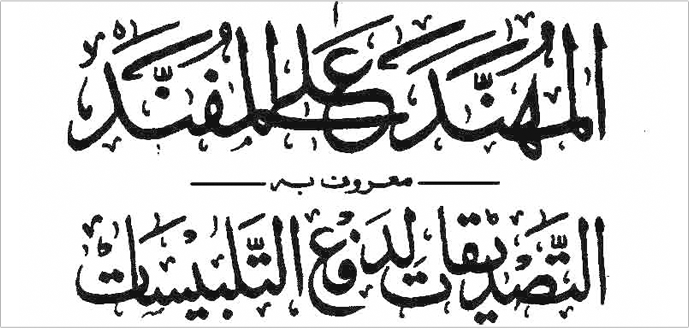
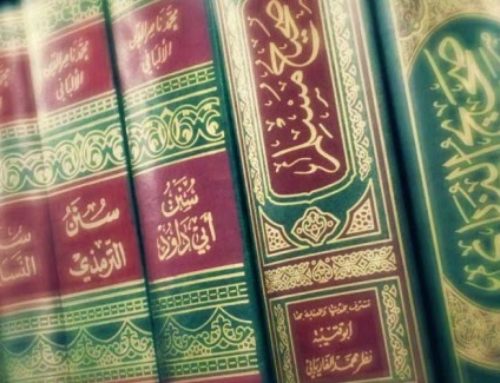
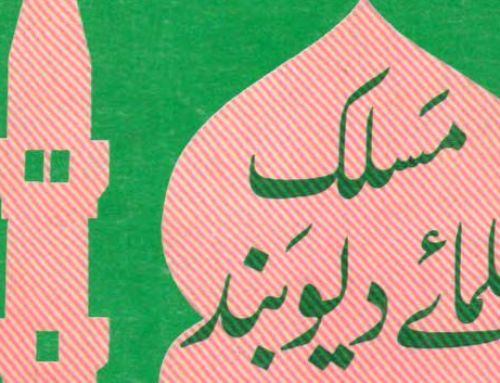
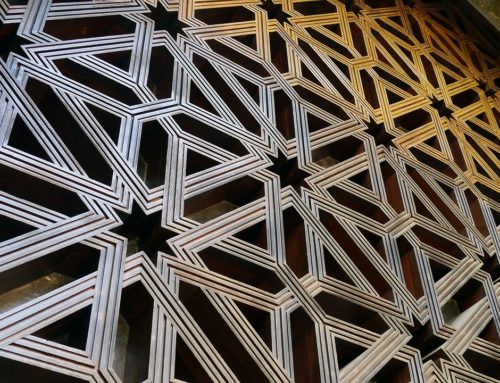
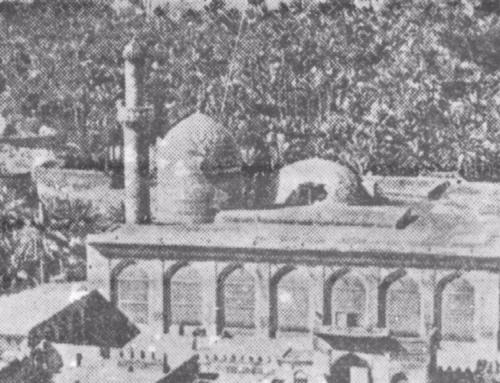
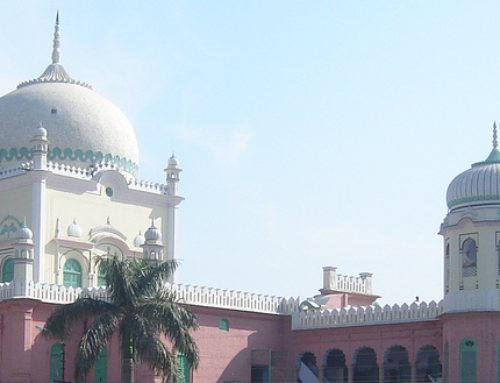
Assalamu alaikum,
Masha’Allah. A much needed translation. I have to say that Deoband.org is doing what we dreamed of 10 years back. May Allah Ta’ala accept all this effort and make it a means of guidance for one and all.
Once again, Jazak Allah u Khairan.
Wassalam
Abuhajira
as salaamu alaykum.
I notice that there are Arab Scholars from Haramain shareef who endorsed the books of scholars from Deoband University. Shaykh al-Sharif Sayyid Ahmad ibn Ismail Barzanji al-Shafi was a great scholar and Mufti of Madinah Shareef who refuted Barelwi leader, Ahmad Raza Khan on the issue of Ilm al-Ghaib. So, the claim of barelwis that only Scholars of Deoband oppose them is a lie. Many Sunnis from Arab world reject the Barelwi creed.
Salaam.
Is anyone translating Mufti Muhammad Adam’s edition of ‘Al Muhannad al Al Mufannad’?
I would love to get my hands on a translated copy of al-Muhannad ala al-Mufannad.
My teacher the eminent scholar of Shaam, As-Sayyid Shaykh Muhammad Al-Yaqoubi clearly stated that one who does not accept Imam Ahmad Raza Khan cannot be from Ahl al Sunnah.
The Great Medinan Scholar Shaykh Abdul Qadir Tawfiq al-Shalabi al-Tarablusi al-Hanafi on Molwi Ahmed Radha Khan
http://zakariyya.wordpress.com/2007/04/02/molwi-ahmed-radha-khan-among-the-arab-ulama/
ok maybe it was mistaken by Imam Ahmed Raza Barlevi and he was misslead by Munafiqs….
Dear Rabani,
I don`t think that Mr Raza was mistaken or mislead. The fact is that he was trying to mislead.